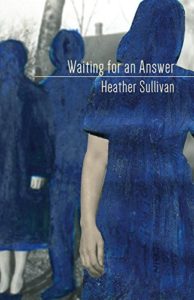Review by Jennifer Martelli
In her poem “Number Four,” Heather Sullivan writes
I would hang there, pinioning wildly,
clawing for ledge or outstretched root,
something to help gain purchase . . . .
Coming home from work
your shadow joins them when
they greet me at the front door. (1)
Sullivan’s debut poetry collection, Waiting for an Answer, strikes that delicate balance between the past and the present, life and death. Whether lamenting a child never born while mourning her own mother or examining the scars of an absent, abusive father while maintaining a marriage that engenders safety, Sullivan masterfully pulls these past worlds through a scrim into the speaker’s present life. The reader, too, walks on “the balance beam in junior high gym class (“Control” 18),” allowing the speaker to guide us a step at a time on that narrowest, most fragile passage between worlds.
Sullivan’s images of boundaries are tactile, organic, and sometimes monstrous as they fuse the emotional with the material. The poem “Slicing” begins with “a Sunday morning poached egg, my edges / are frayed, uneven” (10) before she begins the process of carving herself into a doll. Shame is its own boundary, an emotional electric fence. In “Green Beans,” the shame of poverty suffocates:
From the outside everything looked
lovely, but the oven didn’t work and
all the windows were painted shut.
It was stifling in the summer. We
weren’t supposed to mention any of
it to the landlord, because you were
afraid he’s raise the rent and kick us
out….(12)
The most heart-breaking boundary, though, is the one between the speaker and her deceased mother; a hungry, living boundary. In “Tent,” the mother seems to be reaching up from the earth:
From a distance, the tent caterpillars in my mother’s
backyard, made the trees appear to have webbed
flesh from limb to limb, some ghostly attempt at
colossal hands rising up from the ground. (6)
This image is contrasted in “What She Said.” Here, the speaker sinks down into the mother’s world:
. . . . to stretch myself out on the grass
beside her, close my eyes and let the
dew and time slowly return me to her. (48)
So much in Waiting for an Answer reminds me of a card from the Tarot deck, The Fool, who stands with one foot away from a ledge, a crack in the road, a precarious boundary. It’s a powerful card, representing a beginning or an ending; which way will the traveler go? In “Toronto” she writes
I lean over the edge knowing it would
drive you crazy.
Knowing you would grab me and pull me close.
//
I still lean out over every edge I can find. (5)
Just as the Sullivan’s boundaries become emotional frameworks, so does the idea of dangling and waiting. In “Pain Management,” the speaker is “dying every day since she left, losing / more of my grip on the proper decorum” ( 27). Sullivan erodes the fragile boundaries the speaker tries to erect:
Imaginary boundary lives are set up…
Transitioning with time and circumstance,
if he lies to me,
if he breaks my heart,
if he cheats on me.
You and I used to say
at least he doesn’t hit me. (“This Line Here” 4)
Waiting to move or to fall, the speaker navigates a variegated life of violence and love, or the dead and the living. As the speaker states in “Superstition,” this waiting always requires balance, care, and love:
I avoid cracks with
halting tiptoe steps in a life or death
game of hopscotch.
My heart tosses ahead. (47)
In Waiting for an Answer, Heather Sullivan asks the reader to
Remember me as you pass through
this world and encounter the bluest flower
you have ever seen, bring its memory
home to me. (“Ode to George Eliot” 50)
This masterful debut collection captures that moment of life in that moment before the next move. Sullivan holds this moment in a frame of “popsicle sticks and feathers (29)” or in “hand sewn burlap travel bags.” The poems in this tactile collection root the reader, while at the same time, we are inexorably pulled “soft and silent // I will go wherever you take me” (“Repose” 35).
Waiting for an Answer
by Heather Sullivan
Nixes Mate Books, 2017, $9.95 [paper]
ISBN 9780999188200
Jennifer Martelli’s debut poetry collection, The Uncanny Valley, was published in 2016 by Big Table Publishing Company. She is also the author of the chapbook, Apostrophe and the chapbook, After Bird, from Grey Book Press. Her work has appeared in Thrush, [Pank], Glass Poetry Journal, Cleaver, Tinderbox Poetry Journal, and The Heavy Feather Review. Jennifer Martelli has been nominated for Pushcart and Best of the Net Prizes and is the recipient of the Massachusetts Cultural Council Grant in Poetry. She is a book reviewer for Up the Staircase Quarterly, as well as a co-curator for Mom Egg Review MER VOX Online Quarterly.


